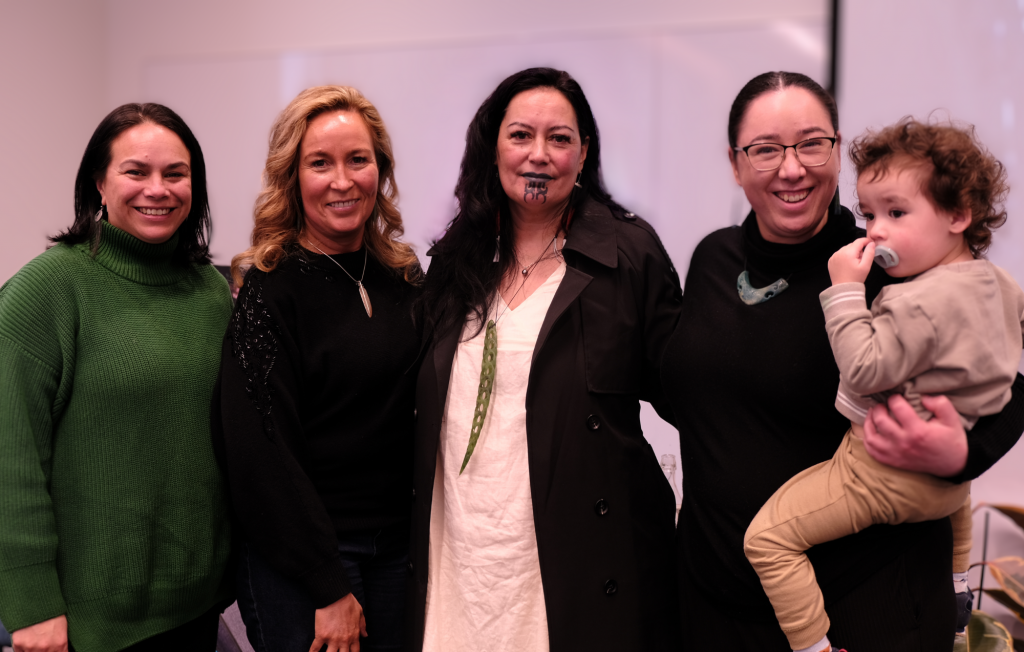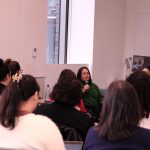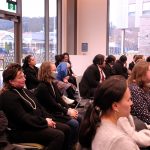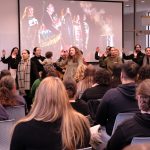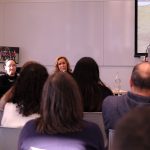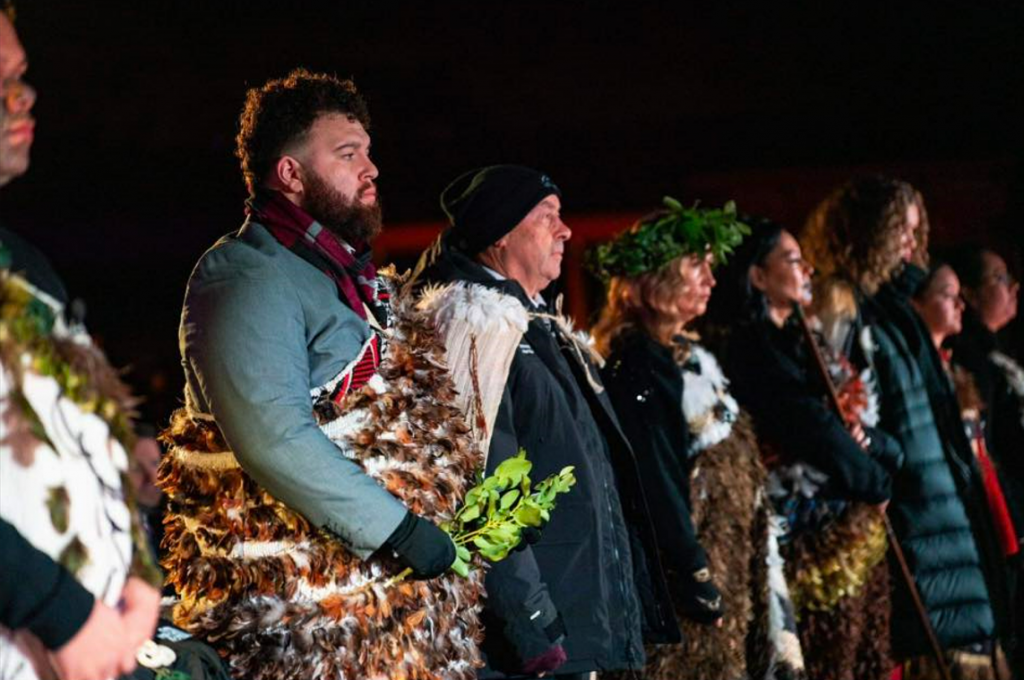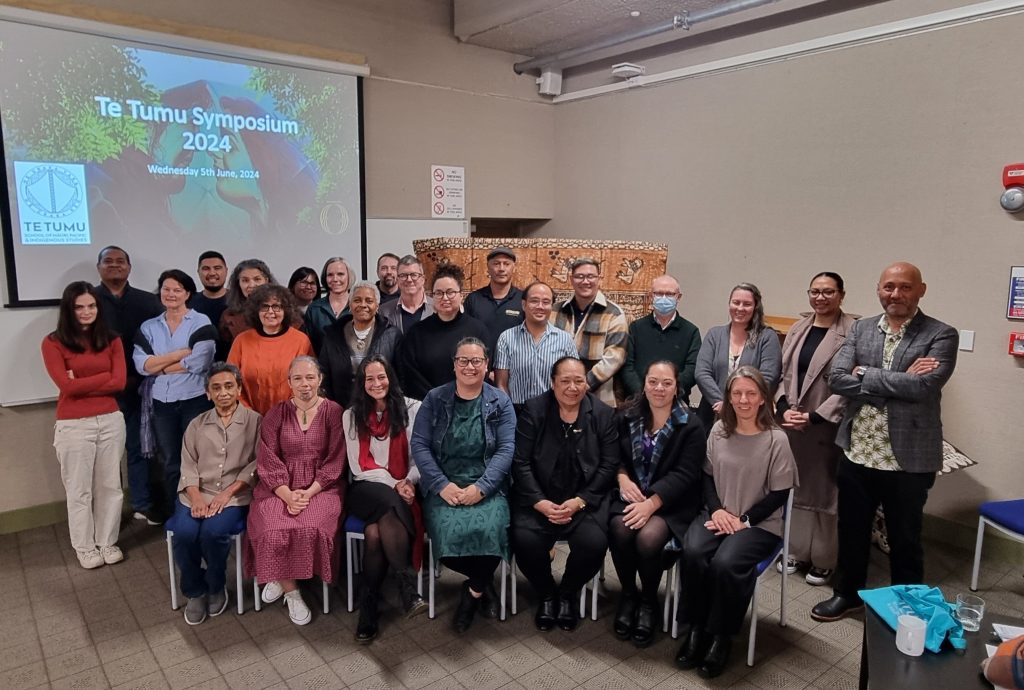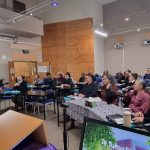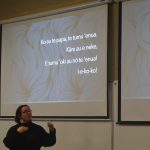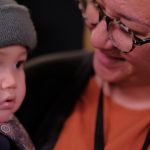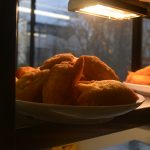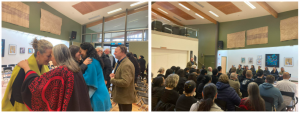Mātauranga Māori seminar from key wāhine Māori centres relationships, community and hapū
Mātauranga Māori was the centre of a fabulous Te Tumu Special Seminar Panel on Wednesday afternoon hosted at Te Rangihīroa College. Te Tumu Pūkenga Kare Tipa facilitated a vibrant, engaging and generous kōrero with wāhine Māori, Paulette Tamati-Elliffe, Tāwini White, Victoria Campbell as they reflected together about their experiences in the national Hautapu for Matariki as well as broader roles and responsibilities they have for uplifting and sustaining mātauranga Māori in their respective spaces.
There were several important themes that developed during the panel including leadership, family and the importance of relationships, locality, community, humility, responsibility, hapū, and doing your best. All of which was well received by a room filled with family, university students and staff, high school students and other interested people from the wider community.
For each of the panellists there were clear moments in their lives where the motivation for wanting their children and their mokopuna to have the language, really pushed the directions that they took in their careers, with their families, and in their communities. As each speaker reflected on her personal journey into te reo, it was clear that the process can look different and take time, but that it can positively change the way you live and the way you connect with the world around you.
Tāwini White commented that her “Mum was the key to the door of Kāi Tahutaka”. Both her parents were strong advocates of te reo and would take her along to things like Kotahi Mano Kāika (KMK) as it launched. As White’s niece made her way in the world, White knew that she wanted to be someone who could provide access to te reo and mātauranga, something she also practices with her two-year-old son.
Victoria Campbell talked about how there are different ways of navigating te reo journeys. Her early experiences of te reo and being Māori were quite formal and centred around her Mum, who, as an excellent cook, would often be out at the marae, at schools or in other community spaces. While her Mum and other women around her would often speak in English, the way they spoke, they idioms they used, the way they were with each other, all connected with Māori ways of being and knowing. Her Mum started learning te reo in her 50s and that has been really inspiring for her to see.
Tamati-Elliffe and her partner wanted to be “te reo grandparents” to create spaces where their children and mokopuna would have te reo because “it’s not just a language, it’s a worldview. Something that connects you to your past, present and future”.
Kare Tipa provided useful framing in the colonial underpinnings of the term mātauranga Māori but also the ways it has been reclaimed by Māori. Which opened a space for the panellists to consider the ways they apply and embed mātauranga in their lives and the work they do. Tipa emphasised that “everything we do comes from our localities, our knowledge”, but not all knowledge belongs to all people. There is knowledge that is specific to whānau, to hapū, to iwi and then there is knowledge for everyone, and it is important to uphold those boundaries.
Campbell also highlighted the importance of connecting with and understanding Indigenous time and seasonality, particularly (but not only) as it is practised for ceremonies related to Matariki and Puaka. Early on, Tamatai-Elliffe made a statement about the vastness of mātauranga Māori as something that one could easily study for a lifetime, “but unless you can apply it, what does it mean?”.
Strong perspectives were also given on the role the university can play in upholding and embedding mātauranga Māori across all spaces in the institution. These wāhine are all significantly involved practitioners of mātauranga Māori. And while some do not consider themselves as experts, it is clear how integral the practice and execution of mātauranga Māori is in their lives and the wide-ranging and beneficial work that they do. This is reflected in the roles they had as part of the kairuruku for the national Hautapu ceremony, but it also extends to kaupapa and movements that have been decades in the making and that each of these women are committed to continuing for the benefit of generations to come.
All the panellists were generous with their time and insight which had deep valuable for all who attended. There is certainly appetite and anticipation for more kōrero of this nature and wider engagement with diverse groups. The event was made possible with support from the Office of Māori Development, the team at Te Rangihīroa College and Te Tumu Research Committee.
Te Tumu scholar part of Kāhui Kairuruku the national Hautapu for Matariki
Ko Kare Tipa tōku ikoa, my ancestry comes from many hapū of Kāi Tahu iwi: (Kāti Ruahikihiki, Kāti Hāteatea,Kāi Te Aotaumarewa, Hinematua, Kāi Tuke, Kāti Huirapa, Kāti Rakiāmoa, Kāi Tuahuriri, Kāti Hinemihi, Kāti Wairaki, Kāti Urihia On Friday 28 June I was honoured to be part of the Kāhui Kairuruku, a collective of language and cultural practitioners that delivered 13 karakia as part of the national Hautapu ceremony held 2,008m above sea level, adjacent to the mighty ranges of Kā Tiritiri O Te Moana, on a pituresque mountain widely known as Treble Cone. Matariki allows us to reflect on whānau and experiences at a time when we welcome the new year. It is also a time to farewell the old, the past year gone.
It was appropriate to hold the hautapu ceremony in Wānaka. Māori history tells of Wānaka where early iwi, in particular ‘Waitaha’, assembled for learning of tribal lore. Wānaka is Kāi tahu alternative form of the word ‘wānanga’ referring to the ancient schools of learning. The area boasts of rocky alpines, tussock foliage and lakes dug out from the eponymous ancestor Rākaihautū. From the ski field on Treble Cone, one is able to feast eyes on the visible features of the land, the aesthetic appeal formed by the digging stick of Rākaihautū. Lakes dug out in Te Waipounamu are known as Kā Puna Karikari a Rākaihatū (the springs of water dug by Rākaihautū).
From ancestoral acts of the past to what is experienced today, Kāti Ruahikihiki descandants (the kairuruku for the hautapu) are made up primarily of young language assailants raised in the Kāi Tahu language revitalisation strategy: Kotahi Mano Kāika (KMK). KMK leads the charge to reinvigorate our language within Kāi Tahu homes and communities. It is a 25 year old strategy which aims to have at least 1000 Kāi Tahu kāika speaking te reo Māori by 2025.
As a practitioner, I have been both a beneficiary of and contributor to KMK. My children and grandson are part of the collective to revitalise and change the narrative with language normalisation here in Te Waipounamu. To be apart of the collective with our young adults is a tremendous highlight for me as a hākui in the strategy. The Hautapu ceremony is shared with a different iwi annually, this recent ceremony is historical for Kāi Tahu, it highlights the language strategy in action alive and vibrant, it sets a precedence of first language speakers who can conduct formal tikaka in te reo. I may not be here to stand with this collective when the Hautapu returns to Kāi Tahu iwi in the future, but I’m proud to have had this moment of standing with first language speakers adding to the histories of today.
Inaugural Te Tumu Symposium a showcase of diverse research excellence
On Wednesday 5 June, Te Tumu, School of Māori, Pacific and Indigenous Studies, hosted its inaugural research symposium to share and celebrate research from Te Tumu. The day began with a welcome from Te Tumu Dean Prof Patrick Vakaoti and a history of Te Tumu from Prof Michael Reilly. The programme included four sessions of Te Tumu staff and postgraduate students’ presentations, constructive question and answers segments, feedback, and encouragement.
Supported by Te Tumu’s Research Committee and Postgraduate Committee, the event welcomed attendance from those who are based in Ōtepoti, as well as distance students who are based in Te Whanganui ā Tara, and as far afield as New Caledonia. With special Tītī and fry bread kai, this gathering was truly an inspiring occasion and speaks to exciting research work that Te Tumu staff and students are doing locally, and regionally that are important contributions for their communities, and for the growth of Māori, Pacific and Indigenous Studies scholarship.
Session 1 was facilitated by Dr Paerau Warbrick, a lecturer in Māori Studies, and included presentations by Te Tumu staff member Paia Taani on intergenerational language transmission; and PhD students, Jenni Tupu who presented about transracial adoption, and Ella Cameron-Smith who presented on Ngaati Korokii Kahukura kai identities.
Session 2 was facilitated by Dr Telesia Kalavite, a lecturer in Pacific Studies, and included presentations by four PhD students: Frédéric Dichtel who presented on te reo grammatical structures; Regina Maniam who presented on engaging Indigenous values and methods in doctoral research; Stacey Kokaua-Balfour who presented on Cook Islands’ creative texts relating to the environment and climate change; and Jay Quintos who presented on critical perspectives on films about the Tboli people in the Philippines.
Session 3 was facilitated by Prof Michael Reilly, the Postgraduate Chair of Te Tumu. The session included staff member Prof Richard Jackson who presented on non-violent approaches to counterterrorism, and two PhD students: Jude Bautista who presented on visual social semiotics and critical lenses in discourse analyses; Kim Cope Tait who presented on personal sovereignty in the poetry of Hinemoana Baker.
Session 4 was facilitated by Dr Emma Powell, lecturer in Indigenous Studies and Programme Coordinator of the Master of Indigenous Studies (MIndS). The session included three MIndS distance students: Melissa Denzler, based in Te Whanganui ā Tara who presented on the cultural taxation of kaiako Māori; Elizabeth Hamilton, based in Whakatū, who presented on a approach for honouring Te Tiriti specifically relating to language learning policies for migrants and former refugees; and James Uri-Puati, based in the Cook Islands, who presented on a critical Indigenous framework for theorising second language learning.
Early career Cook Island researchers shine at the Pacific Islands Universities Network Conference 2023 ki Rarotonga
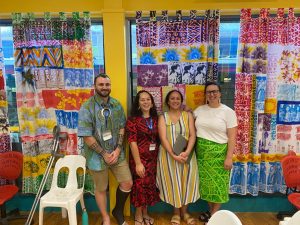
L-R: Cook Islands scholars Liam Koka’ua, Inano Taripo Walter, Dr Emma Powell, Stacey Koka’ua Balfour
Dr Emma Powell writes about her recent trip to Rarotonga for the 2023 Pacific Islands Universities Network Conference.
Established in 2012, the Pacific Islands Universities Network (PIURN) Conference was intended to “enable closer and meaningful collaboration” amongst a consortium of 14 universities located in the island-Pacific. Rarotonga was chosen as the location for the networks 5th meeting and several doctoral students and Otago staff travelled to the Cook Islands to participate in the regional conference on 4-6 July 2023.
Dr Emma Powell arranged a special session for Cook Islands early career researchers on 6 July local time. Inspired by the arrangement of a festschrift for Cook Islands scholar and educator, the late Dr Marjorie Crocombe, during the conference, the session was intended to honour an pioneering generation of scholars, many of whom were mentored by Dr Crocombe, and signal new turns in Cook Islands scholarship from a swelling critical mass of new Cook Islands researchers.
Inano Taripo Walter, who is a Cook Islands doctoral candidate with secondary supervision at Te Tumu, presented on the role of va‘ine Māori within the land court. She discussed the importance of piri‘anga (relationships), ‘akapapa‘anga (genealogies) and mana to understanding the significance of women in the arbitration of ‘enua (land) within Cook Islands society. Stacey Kokaua, a Cook Islands doctoral candidate in Otago’s English department, presented her early stages of research into Cook Islands Māori theoretical responses to ecocriticsm within literary studies. Liam Kokaua, a graduate of the University of Auckland’s Masters of Indigenous Studies programme, shared compelling research he’d undertaken about the pae maunga on Rarotonga. Liam has produced material for screen and a book that makes accessible ancient and new knowledge about tupuna maunga in the Cook Islands.
The session was well-attended by other Cook Islands and Pacific delegates. The Q&A session was engaging and the panel received an overwhelming number of questions and comments that showed enthuasism both for their respective projects and the wider project of Cook Islands scholarship.
Unexpectedly and with sadness, the session seemed even more poignant with the surprise passing of legendary Cook Islands scholar, musician, writer and public servant, Professor Jon Jonassen, on the first day of the PIURN Conference. Professor Jonassen was widely acknowledged as an expert on Cook Islands peu Māori (cultural traditions), tua ta‘ito (ancients stories) and the Cook Islands drumming tradition. His passing during the conference was a shock to many attending and was felt sharply during the session.
Acknowledgements must also go to Univeristy of Otago colleagues who presented at the conference: Dr Moira Fortin Cornejo (Languages and Cultures) and Dr Jesse Kokaua & Dr Troy Ruhe (Va‘a o Tautai). Dr Powell also presented at the festschrift session for Dr Crocombe where she spoke to a brief paper titled: “That we may be proud of our heritage”, Marjorie Crocombe & Pacific Literature.
Te Poroāki o Lachy Paterson & te Pōhiri o Roma Donaldson-Gush
Last week Te Tumu celebrated well with the retirement of Emeritus Professor Lachy Paterson and the arrival of new Māori Studies pūkenga, Roma Donaldson-Gush. Roma, of Ngāti Porou, Taranaki, Ngāti Tūwharetoa, Kotirana descent, joins Te Tumu staff with a background in bilingualism and intergenerational language and culture transmission for Māori. Roma will be completing her PhD studies as well as teaching into the Māori Studies programme. She is a Te Tumu alumnus having previously completed postgraduate study looking at Te Reo Māori in urban New Zealand. The pōhiri, held on Wednesday 28 June, included representatives from Office of Māori Development, Te Huka Mātauraka, Te Rōpū Māori, staff from Te Tumu and the wider university. Roma was supported by her whānau, colleagues, and friends in a day filled with the celebration of new relationships and excitement for the future of Te Tumu.
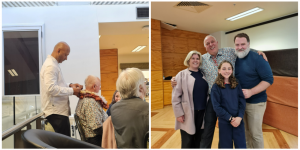
L: Dean of Te Tumu Patrick Vakaoti garlanding Lachy with a salusalu. R: Angela Wanhalla, Lachy Paterson and whānau
Ara mai he tētēkura, wehe atu he tētēkura. With a new frond beginning, a mature frond leaves.
With over 16 years of service as a teacher, mentor, friend, and conspirator, Lachy Paterson was farewelled in an intimate gathering of colleagues and whānau on Friday 30 June. Many spoke of the contributions Lachy has made to Māori Studies, Te Tumu and the university as a whole with several teaching, administration and leadership roles. Stories unfolded about his days as a student, teaching fellow and ultimately his unrelenting commitment to Te Tumu. Although it was a bittersweet day, Te Tumu looks forward to a continuing relationship with Lachy as an emeritus professor and eagerly await his future publications and foray into YouTube.

